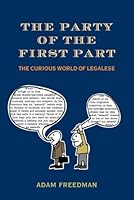
## Metadata
- Author: [[Adam Freedman]]
- Full Title: The Party of the First Part
- Category: #books
## Highlights
- The conspiracy theory dates back to the nineteenth-century philosopher Jeremy Bentham, who said that “the easiest way to create a monopoly is to invent a language and procedure which will be unintelligible to the layman … . In many ways it is … the art of the ancient and noble profession of the law.” ([Location 248](https://readwise.io/to_kindle?action=open&asin=B008DM2M3U&location=248))
- The contemporary British academic Peter Goodrich, for example, acidly argues that lawyers use “archaic” terminology in order to prop up “an economic elite and the discriminatory values that serve such an elite.” ([Location 251](https://readwise.io/to_kindle?action=open&asin=B008DM2M3U&location=251))
- The ancient Egyptians developed a special form of hieroglyphics—demotic script—specifically for law and government. Demotic has been called the “original legalese.” ([Location 259](https://readwise.io/to_kindle?action=open&asin=B008DM2M3U&location=259))
- In March 2005, the New York Times reported that fewer than 5 percent of the twenty million potential applicants were expected to apply for the government’s new prescription drug benefit, because the forms were too complicated for people to understand. In Britain, the Plain English Campaign estimates that billions of pounds of government benefits go unclaimed for the same reason. ([Location 272](https://readwise.io/to_kindle?action=open&asin=B008DM2M3U&location=272))
- There are only two ways to boost legal literacy: Either make legal language more intelligible, or send everyone to law school. ([Location 277](https://readwise.io/to_kindle?action=open&asin=B008DM2M3U&location=277))
- The proliferation of French also made it fashionable to put the noun before the adjective (it’s le style français) and a number of legal phrases retain the inverted word order, such as attorney general, court martial, accounts payable, and fee simple. The age of “law French” was also the beginning of the diabolical Precision School of legal language, for many lawyers justified the use of French on the grounds that it was inherently more precise than English for expressing legal concepts. As late as 1824, an English barrister could proclaim that “the law is scarce expressible properly in English.” ([Location 393](https://readwise.io/to_kindle?action=open&asin=B008DM2M3U&location=393))
- The passion for bilingualism left English law with a tradition of double-barreled phrases—breaking and entering, fit and proper, free and clear—each created by combining English and French synonyms. Consider the following list (French-derived words in italics): breaking and entering fit and proper free and clear goods and chattels had and received peace and quiet right, title, and interest will and testament ([Location 402](https://readwise.io/to_kindle?action=open&asin=B008DM2M3U&location=402))
- “Superstition” would be the best word to describe the law’s attitude toward forms. Like a gambler unwilling to wash his lucky shirt lest it lose some of its magic, the average lawyer wouldn’t change a comma in a trusted boilerplate form. In Australia, a corporate executive once tried to rewrite one of her company’s standard form contracts. Where the existing contract said: The Agreement shall commence on ________ and expire on _______. the executive wanted to replace commence and expire with start and finish. The company’s legal department objected to the proposal, contending that start and finish “do not yet have established meanings” in law. ([Location 431](https://readwise.io/to_kindle?action=open&asin=B008DM2M3U&location=431))
- In 1978, New York State enacted America’s first general plain language law. Today, most states have laws requiring plain English in consumer documents. Incidentally, the lawyer who got the ball rolling at Citibank was a young man named Duncan MacDonald, who, only five years before he rewrote the promissory note, had received a C from a law school writing instructor who objected to his unconventional ideas. ([Location 478](https://readwise.io/to_kindle?action=open&asin=B008DM2M3U&location=478))
- Lawsuit itself is a curious term. It comes from the Latin secta, which means followers. In the Middle Ages, a litigant was required to bring a group of followers to court to vouch for the truth of his statements. This requirement was eventually dropped; however, in classic fashion, the language remained frozen. Law clerks continued to refer to the act of starting a court case as bringing a secta, which, over time, was translated into the English (via Old French) suite. By the seventeenth century, the term had morphed into law-suite and then law-suit, and finally the unhyphenated word we have today. ([Location 549](https://readwise.io/to_kindle?action=open&asin=B008DM2M3U&location=549))